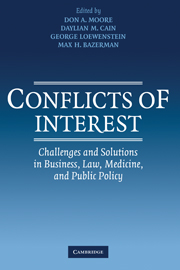Book contents
- Frontmatter
- Contents
- List of Contributors
- Acknowledgments
- Introduction
- PART ONE BUSINESS
- 1 Managing Conflicts of Interest within Organizations: Does Activating Social Values Change the Impact of Self-Interest on Behavior?
- 2 Commentary: On Tyler's “Managing Conflicts of Interest within Organizations”
- 3 A Review of Experimental and Archival Conflicts-of-Interest Research in Auditing
- 4 Commentary: Conflicts of Interest in Accounting
- 5 Bounded Ethicality as a Psychological Barrier to Recognizing Conflicts of Interest
- 6 Commentary: Bounded Ethicality and Conflicts of Interest
- 7 Coming Clean but Playing Dirtier: The Shortcomings of Disclosure as a Solution to Conflicts of Interest
- 8 Commentary: Psychologically Naive Assumptions about the Perils of Conflicts of Interest
- PART TWO MEDICINE
- PART THREE LAW
- PART FOUR PUBLIC POLICY
- Index
- References
2 - Commentary: On Tyler's “Managing Conflicts of Interest within Organizations”
Published online by Cambridge University Press: 04 August 2010
- Frontmatter
- Contents
- List of Contributors
- Acknowledgments
- Introduction
- PART ONE BUSINESS
- 1 Managing Conflicts of Interest within Organizations: Does Activating Social Values Change the Impact of Self-Interest on Behavior?
- 2 Commentary: On Tyler's “Managing Conflicts of Interest within Organizations”
- 3 A Review of Experimental and Archival Conflicts-of-Interest Research in Auditing
- 4 Commentary: Conflicts of Interest in Accounting
- 5 Bounded Ethicality as a Psychological Barrier to Recognizing Conflicts of Interest
- 6 Commentary: Bounded Ethicality and Conflicts of Interest
- 7 Coming Clean but Playing Dirtier: The Shortcomings of Disclosure as a Solution to Conflicts of Interest
- 8 Commentary: Psychologically Naive Assumptions about the Perils of Conflicts of Interest
- PART TWO MEDICINE
- PART THREE LAW
- PART FOUR PUBLIC POLICY
- Index
- References
Summary
I want to frame what I have to say about Tyler's excellent and provocative chapter by contrasting its results to my previous favorite and provocative work examining the relationship between egoistic preference and norms of fairness. That work is of Eddie Van Avermaet in his 1974 dissertation at the University of California in Santa Barbara (as summarized by Messick & Sentis, 1983).
Van Avermaet's work was experimental, and it was based on a mild deception. Subjects entered the laboratory in pairs and were asked to fill out a number of questionnaires. “When the subject finished the questionnaires, the experimenter entered the room and said in a rather irritated way that the other person had to leave immediately. He explained that he could pay each pair of subjects $7.00 for their help and they had wanted the two subjects to jointly decide how to divide the money. Now that the other had left, the experimenter could not do that and, moreover, the experimenter said he himself had an appointment in a very few minutes. After reviewing the amount of time and the number of tests that the subject and the other person had done, the experimenter suggested that the subject take the entire $7.00 along with a stamped envelope addressed to the other subject, take what the subject considered to be his or her share of the $7.00, put the remainder into the envelope, and mail it to the other subject.
- Type
- Chapter
- Information
- Conflicts of InterestChallenges and Solutions in Business, Law, Medicine, and Public Policy, pp. 36 - 40Publisher: Cambridge University PressPrint publication year: 2005
References
- 1
- Cited by

